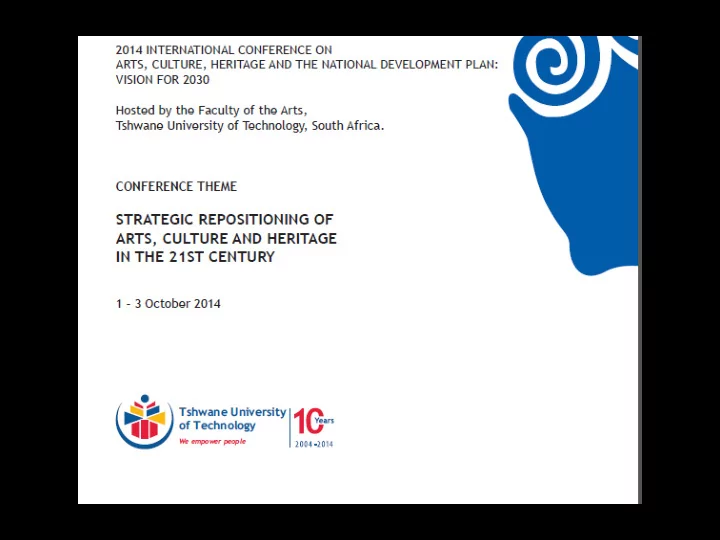

POST- APARTHEID SOUTH AFRICA’S ROLE IN REPOSITIONING MODERN AFRICAN ART MUSIC IN THE 21 ST CENTURY Ayọ̀ Olúrántí, PhD
Does African art music exist as a distinct genre? Art music was indeed in existence as an integral part of African traditional music prior to the events that re-shaped the African musical landscape through Christianity, Islam, apartheid and colonization.
“Some people will argue … that art music did not exist in Africa before the emergence of the western-derived idioms. This notion is based on the belief that art music implies contemplative listening and, because African traditional music is mainly utilitarian (being integrated with ceremonies and other social functions), there are not prototypes in traditional culture for what present-day composers are doing. This notion is wrong … for although African traditional music is often utilitarian, not all of this music is Akin Euba functional. ” (1970)
“ Modern art music composers aim to eliminate or subdue the social functional aspect of traditional music and elevate the contemplative quality, which, though present in traditional music, seems often to play a secondary role. In other words, the composers seek to extract the new ‘ art ’ music from the event-performance situation of traditional music and confine it to the concert platform where there would be a clearer distinction between the audience and the performers. ” Joshua Uzoigwe (1992)
“Compositions written by Africans … even when they have … utilized elements of African music have generally conformed to European ideals to such a degree that the African elements have been overshadowed by the Western. The influences at work here are so forceful that the music produced must be regarded as representing an almost total rejection of African norms. ” Akin Euba (1970)
“… When African composers are not writing within the Western tradition … they seem unable to produce works … that are idiomatically African. At best they hover between Western and African traditions without achieving a satisfactory integration of both. ” (1993) “ African (art) music, in the sense of a Abiola Irele conscious and elaborated art form with distinguishable stylistic conventions is not possible. ” (1993)
To achieve a tradition of art music that is distinctively African, composers must develop appropriate compositional frameworks that will enable them deal at deeper structural levels with the Akin Euba details of musical form and language. (Euba, 1970 & Nketia, 1995) Kwabena Nketia
ADVOCACY The repositioning of modern African art music to be more strongly rooted in the principles, theory, structure, instrumentation and practice of traditional African music. RATIONALE Traditional African music, incorporating traditional African art music, distinctively identifies the people of Africa. Therefore, the possibility of establishing a modern art genre that will strongly identify Africa is feasible with the traditional genre as the main source and point of departure.
“Re -establishing political, economic, and cultural ties with the region and the continent as a whole has been one of the goals of the post- apartheid government in South Africa.” “The constitution of South Africa is one that strives to represent and protect the linguistic, cultural, religious, economic, and legal rights and interests of all its peoples.” Carol Muller (2009)
Thus, emerging from apartheid, South Africa is experiencing a renaissance in virtually all aspects of her social, cultural and political existence. This coupled with the national mandate to redress the past imbalances in the arts of the previously marginalized South African people provides a strong platform for the country to champion the cause of repositioning modern African art music for the attainment of a status that is more “African” via the development of new art music idioms that will be derived from traditional African musical genres.
A major challenge in post-apartheid South Africa has been to generate local music products that can compete with, and perhaps be sold to, international markets. Carol Muller Gary Baines Randall Abrahams (2009) (2003) (1998)
Revision of Music Curriculum o Study of Traditional Music & Instrument (Primary & Secondary educational systems) Creation of Indigenous Musical Arts Centers o Collection, Documentation, Preservation, Development & Promotion of South African Indigenous music Expansion of Tertiary Institution Scholarship System o Creative Musicology practice o Adoption of “ Practice-based research ” system
Based on Bartók’s approach to art music composition Principle rooted in ethnomusicological theory Composers to do fieldwork as part of compositional activity • The application of musicology to composition • The process of moving from analysis to synthesis • The transformational zone between research and composition Akin Euba
• To realize a stronger African identity there is the need for African composers to consider a new compositional direction. A re-definition of African art music based on African traditional music potentially offers a feasible approach to achieving a stronger African identity. • A focus on the excavation of the architectural designs that operate at the background of African traditional genres, which can be employed verbatim (or further developed) as a template to create art music while incorporating the sound world (instrumentation, pitch, tuning et al) unique to these indigenous genres is therefore advocated. • With the spirit of re-birth, post-apartheid South Africa is positioned to lead the drive for a stronger African identity in the modern art music industry.
Recommend
More recommend